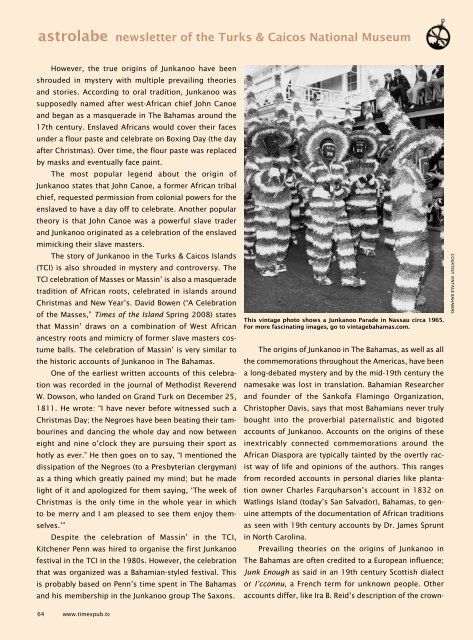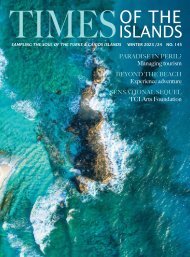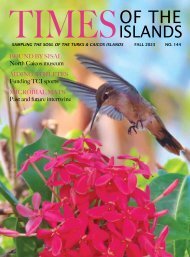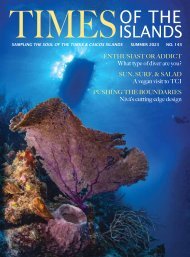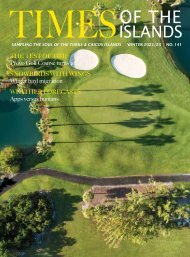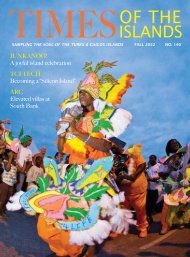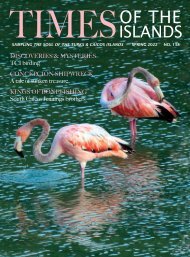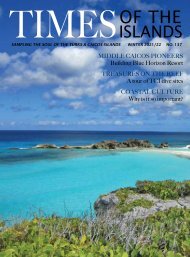Times of the Islands Summer 2022
Presents the "soul of the Turks & Caicos Islands" with in-depth features about local people, culture, history, environment, real estate, businesses, resorts, restaurants and activities.
Presents the "soul of the Turks & Caicos Islands" with in-depth features about local people, culture, history, environment, real estate, businesses, resorts, restaurants and activities.
You also want an ePaper? Increase the reach of your titles
YUMPU automatically turns print PDFs into web optimized ePapers that Google loves.
astrolabe newsletter <strong>of</strong> <strong>the</strong> Turks & Caicos National Museum<br />
However, <strong>the</strong> true origins <strong>of</strong> Junkanoo have been<br />
shrouded in mystery with multiple prevailing <strong>the</strong>ories<br />
and stories. According to oral tradition, Junkanoo was<br />
supposedly named after west-African chief John Canoe<br />
and began as a masquerade in The Bahamas around <strong>the</strong><br />
17th century. Enslaved Africans would cover <strong>the</strong>ir faces<br />
under a flour paste and celebrate on Boxing Day (<strong>the</strong> day<br />
after Christmas). Over time, <strong>the</strong> flour paste was replaced<br />
by masks and eventually face paint.<br />
The most popular legend about <strong>the</strong> origin <strong>of</strong><br />
Junkanoo states that John Canoe, a former African tribal<br />
chief, requested permission from colonial powers for <strong>the</strong><br />
enslaved to have a day <strong>of</strong>f to celebrate. Ano<strong>the</strong>r popular<br />
<strong>the</strong>ory is that John Canoe was a powerful slave trader<br />
and Junkanoo originated as a celebration <strong>of</strong> <strong>the</strong> enslaved<br />
mimicking <strong>the</strong>ir slave masters.<br />
The story <strong>of</strong> Junkanoo in <strong>the</strong> Turks & Caicos <strong>Islands</strong><br />
(TCI) is also shrouded in mystery and controversy. The<br />
TCI celebration <strong>of</strong> Masses or Massin’ is also a masquerade<br />
tradition <strong>of</strong> African roots, celebrated in islands around<br />
Christmas and New Year’s. David Bowen (“A Celebration<br />
<strong>of</strong> <strong>the</strong> Masses,” <strong>Times</strong> <strong>of</strong> <strong>the</strong> Island Spring 2008) states<br />
that Massin’ draws on a combination <strong>of</strong> West African<br />
ancestry roots and mimicry <strong>of</strong> former slave masters costume<br />
balls. The celebration <strong>of</strong> Massin’ is very similar to<br />
<strong>the</strong> historic accounts <strong>of</strong> Junkanoo in The Bahamas.<br />
One <strong>of</strong> <strong>the</strong> earliest written accounts <strong>of</strong> this celebration<br />
was recorded in <strong>the</strong> journal <strong>of</strong> Methodist Reverend<br />
W. Dowson, who landed on Grand Turk on December 25,<br />
1811. He wrote: “I have never before witnessed such a<br />
Christmas Day; <strong>the</strong> Negroes have been beating <strong>the</strong>ir tambourines<br />
and dancing <strong>the</strong> whole day and now between<br />
eight and nine o’clock <strong>the</strong>y are pursuing <strong>the</strong>ir sport as<br />
hotly as ever.” He <strong>the</strong>n goes on to say, “I mentioned <strong>the</strong><br />
dissipation <strong>of</strong> <strong>the</strong> Negroes (to a Presbyterian clergyman)<br />
as a thing which greatly pained my mind; but he made<br />
light <strong>of</strong> it and apologized for <strong>the</strong>m saying, ‘The week <strong>of</strong><br />
Christmas is <strong>the</strong> only time in <strong>the</strong> whole year in which<br />
to be merry and I am pleased to see <strong>the</strong>m enjoy <strong>the</strong>mselves.’”<br />
Despite <strong>the</strong> celebration <strong>of</strong> Massin’ in <strong>the</strong> TCI,<br />
Kitchener Penn was hired to organise <strong>the</strong> first Junkanoo<br />
festival in <strong>the</strong> TCI in <strong>the</strong> 1980s. However, <strong>the</strong> celebration<br />
that was organized was a Bahamian-styled festival. This<br />
is probably based on Penn’s time spent in The Bahamas<br />
and his membership in <strong>the</strong> Junkanoo group The Saxons.<br />
This vintage photo shows a Junkanoo Parade in Nassau circa 1965.<br />
For more fascinating images, go to vintagebahamas.com.<br />
The origins <strong>of</strong> Junkanoo in The Bahamas, as well as all<br />
<strong>the</strong> commemorations throughout <strong>the</strong> Americas, have been<br />
a long-debated mystery and by <strong>the</strong> mid-19th century <strong>the</strong><br />
namesake was lost in translation. Bahamian Researcher<br />
and founder <strong>of</strong> <strong>the</strong> Sank<strong>of</strong>a Flamingo Organization,<br />
Christopher Davis, says that most Bahamians never truly<br />
bought into <strong>the</strong> proverbial paternalistic and bigoted<br />
accounts <strong>of</strong> Junkanoo. Accounts on <strong>the</strong> origins <strong>of</strong> <strong>the</strong>se<br />
inextricably connected commemorations around <strong>the</strong><br />
African Diaspora are typically tainted by <strong>the</strong> overtly racist<br />
way <strong>of</strong> life and opinions <strong>of</strong> <strong>the</strong> authors. This ranges<br />
from recorded accounts in personal diaries like plantation<br />
owner Charles Farquharson’s account in 1832 on<br />
Watlings Island (today’s San Salvador), Bahamas, to genuine<br />
attempts <strong>of</strong> <strong>the</strong> documentation <strong>of</strong> African traditions<br />
as seen with 19th century accounts by Dr. James Sprunt<br />
in North Carolina.<br />
Prevailing <strong>the</strong>ories on <strong>the</strong> origins <strong>of</strong> Junkanoo in<br />
The Bahamas are <strong>of</strong>ten credited to a European influence;<br />
Junk Enough as said in an 19th century Scottish dialect<br />
or I’cconnu, a French term for unknown people. O<strong>the</strong>r<br />
accounts differ, like Ira B. Reid’s description <strong>of</strong> <strong>the</strong> crown-<br />
COURTESY VINTAGE BAHAMAS<br />
64 www.timespub.tc


